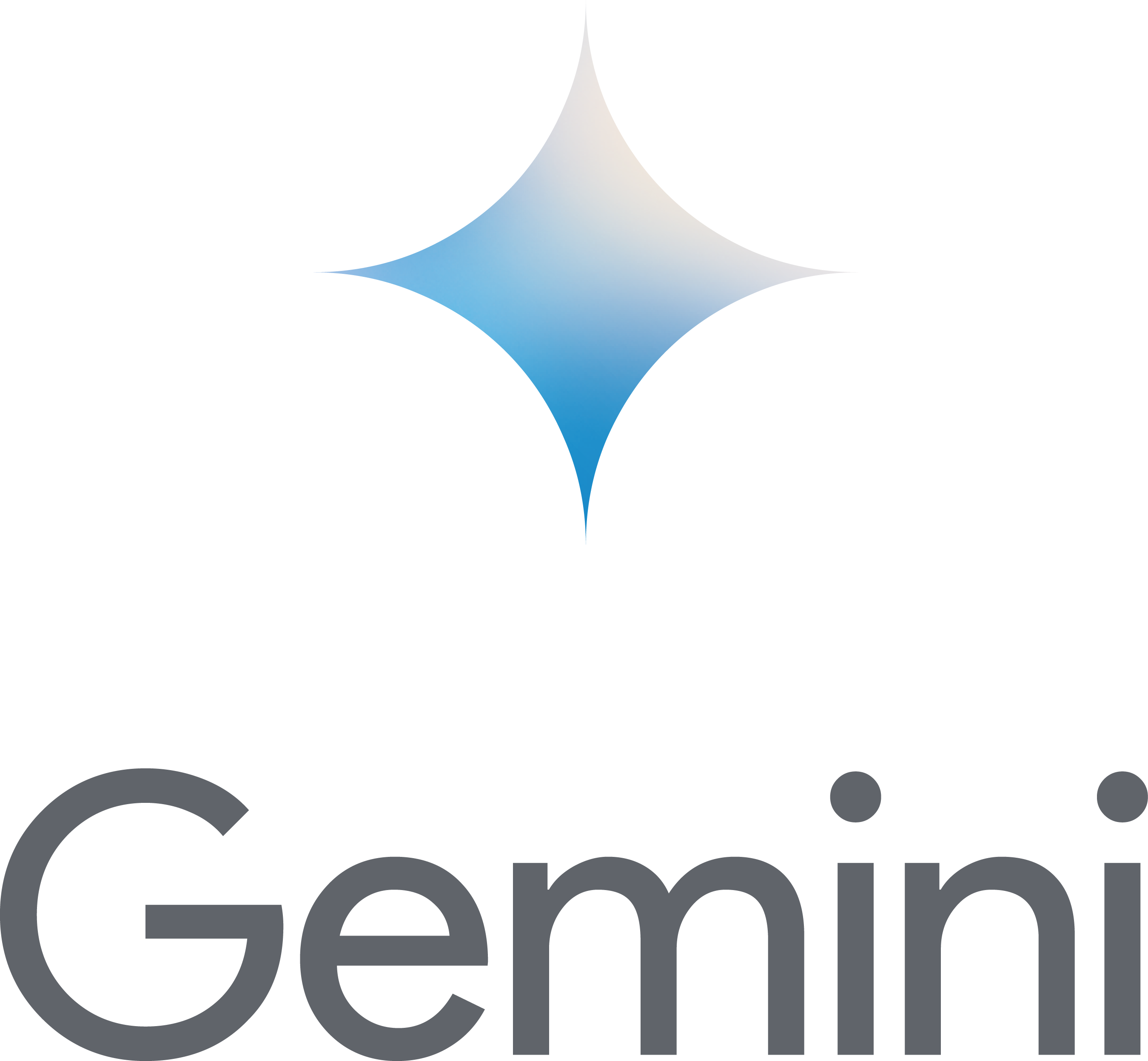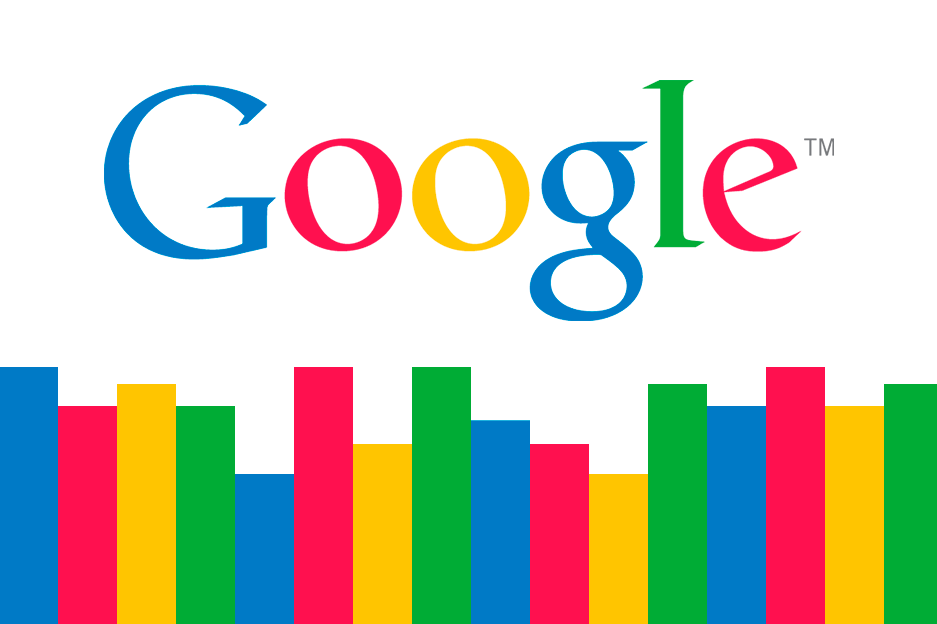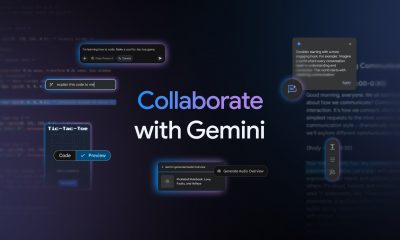Technology
15 Exciting Highlights from Google I/O 2023

At the annual Google I/O developer conference, a wide array of cutting-edge technologies and updates were showcased, all aimed at enhancing user experiences across various platforms. Google emphasised its commitment to improving search experiences and ensuring user safety by introducing new generative AI capabilities for search and implementing advanced tools for online protection.
Significant updates were also announced for Android, Pixel devices, and Google Photos. A standout moment of the conference was the unveiling of PaLM 2, Google’s latest generative language model. This breakthrough model surpasses previous language models in areas such as maths, coding, reasoning, multilingual translation, and natural language generation.
In addition to these advancements, Google reiterated its commitment to responsible AI, striving to address pressing societal challenges like climate change and flood forecasting while maintaining ethical AI practices.
Here are the 15 significant announcements made at Google IO that we thought would be of interest to you:
-
PaLM 2, next generation language model: Google has unveiled PaLM 2, a next-generation language model designed to improve language translation, reasoning, and coding capabilities. The model is more heavily trained on multilingual text, demonstrating advanced proficiency in logic, common sense reasoning, and mathematics. Additionally, PaLM 2 was pre-trained on publicly available source code datasets, making it more efficient and faster than previous models. PaLM 2 will be available in four sizes, from smallest to largest: Gecko, Otter, Bison, and Unicorn, making it versatile for a range of use cases. The model is set to power 25 new Google products and features, including Bard and Med-PaLM 2, a medical competency model that can answer questions and summarise insights from dense medical texts. Learn more about PaLM 2 here.
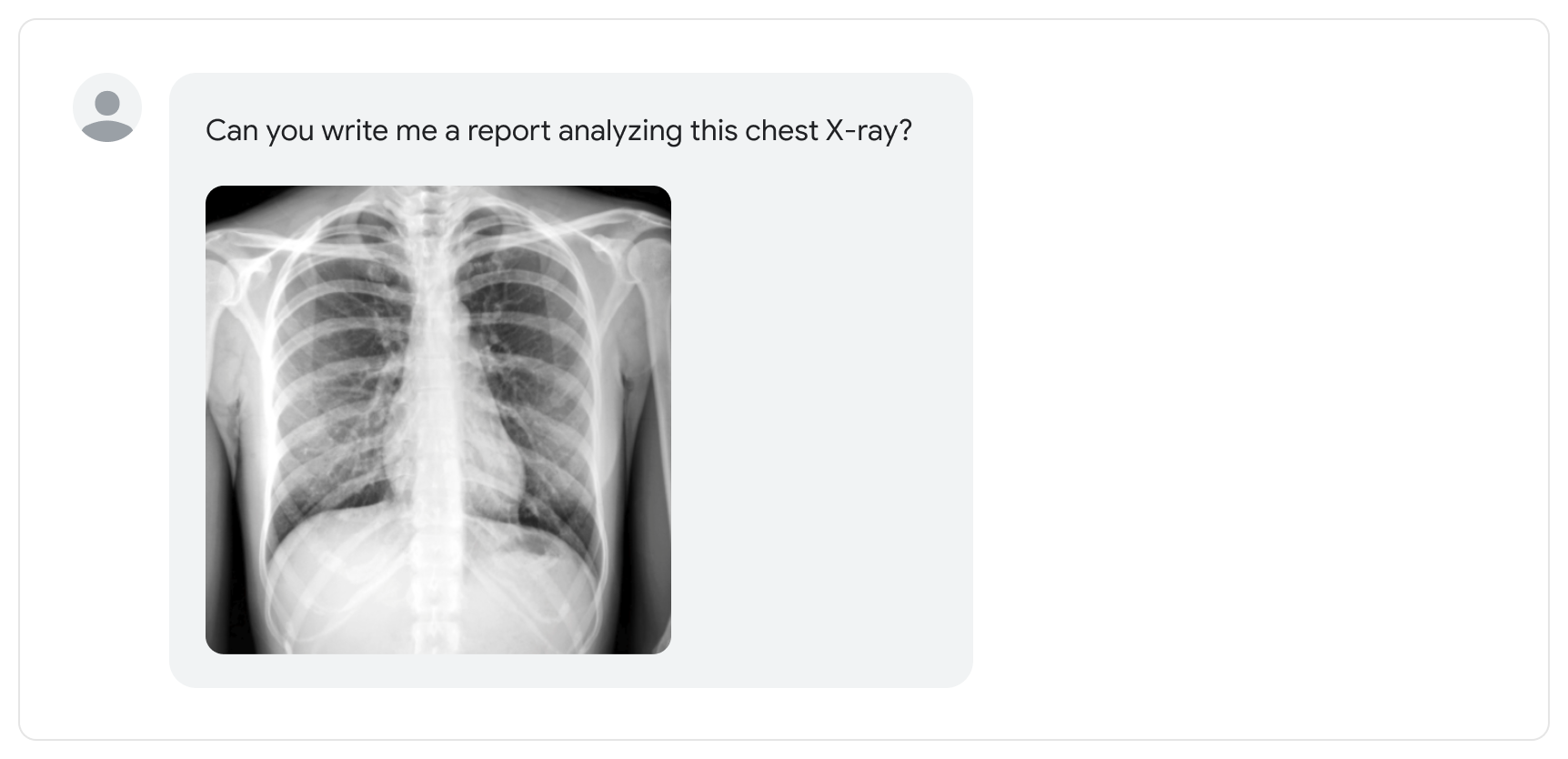
-
Expansion of Bard: The waitlist has now been removed, making Bard available in English in over 180 countries and territories, with the addition of Japanese and Korean languages, and planning to support the world’s top 40 languages. As the platform expands, Google will focus on maintaining high standards for quality, local nuances and adherence to AI principles. More here.

-
Image Capabilities: Google is making it easier to prompt Bard with images, using Google Lens. This integration of images with text in Bard aims to enrich the user experience by providing visually informative responses to queries. Users can also include images in their prompts, offering new possibilities for creativity and imagination. More here
-
Developer Features for Bard: Google is introducing three new ways to use Bard based on developer feedback: Making code citations even more precise by showing you the source of specific blocks of code. This also applies to citing narrative content from across the web; by adding export to Replit and by making Bard friendlier on the eyes in low-light conditions by introducing Dark theme. More here
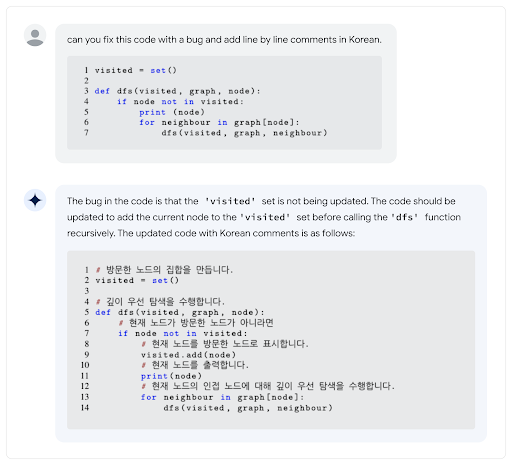
-
Export to Docs and Gmail: Google is making it easier and more seamless for users to continue their work by exporting Bard’s responses to Google Docs or Gmail. Formatting stays intact so users can continue editing directly in Docs or Gmail without needing to copy, paste, and reformat Bard’s responses.
-
Integration into Apps:: Bard will be integrating with various Google apps and services like Docs, Drive, Gmail, Maps, and more, while maintaining user control over privacy settings. The platform will also connect with external services and partners, such as Adobe Firefly for image creation, Kayak for travel, Instacart for groceries, Wolfram for computational knowledge, and Khan Academy for education, offering a wide range of possibilities for users.
-
Integrating generative AI across all the Workspace apps: The new features help one write, organise, visualise, accelerate workflows, have richer meetings, and much more. This powerful new way of working is what Google calls Duet AI for Workspace. Google is bringing the generative AI experience to Gmail on mobile and embedding generative AI into Slides so one can easily create unique visuals with a few words. The generative AI will help one analyse and act on data in Sheets, with automated data classification and the creation of custom tables.
-
Simplifying Shopping with Generative AI: Google is using generative AI to make shopping faster and much easier, providing users with a snapshot of noteworthy factors to consider when searching for a product. Built on Google’s Shopping Graph, this new generative AI shopping experience will offer a seamless and informed decision-making process for users.
-
Search Labs: Google’s advanced generative AI capabilities are now accessible through Search Labs, an innovative platform that allows users to explore and engage with early-stage experiments in Search. By registering for Search Labs, users have the opportunity to experience the Search Generative Experience (SGE) on Chrome desktop and the Google App in the US (available in English at launch).
-
Magic Compose: Magic Compose, a new Messages by Google feature powered by generative AI, can help you add an extra spark of personality to your conversations. The feature offers suggested responses based on the context of your messages and can even transform your writing into different styles. Release set for July.
-
New AI features in Android: Google’s upcoming Android 14 update (expected later this year) promises to change the way users personalise their smartphone experience, taking customization to the next level. Material You customization enables users to personalise their lock screen with new shortcuts, clocks, and a monochrome colour theme. The update also offers diverse wallpaper options, including emoji, cinematic, and generative AI wallpapers that allow users to generate unique designs based on their preferences. To enhance social media, Google is bringing Night Mode and 10-bit HDR video support to popular social apps like Instagram. The Android 14 update introduces Ultra HDR, promising stunning photo quality and raising the bar for smartphone photography.
-
Reimagine Your Photos with Magic Editor in Google Photos: The new experimental editing feature, Magic Editor, powered by generative AI, will enable users to make complex photo edits effortlessly without requiring professional editing skills. Users can selectively edit specific parts of an image, such as the subject, sky, or background, for more control over the final appearance of their photos.
-
Features and Updates to Enhance Online Safety and Trust: Google’s new suite of features and updates aims to improve online safety and provide users with reliable access to trustworthy content and information. The “About This Image” tool helps users evaluate the reliability of visual content found online by providing important contextual information, such as when an image was first indexed by Google, its original appearance, and other online occurrences. Google is also expanding its Content Safety API to include potential child sexual abuse material in video content, addressing a critical safety concern as video files account for nearly 50% of all files reported to the National Center for Missing and Exploited Children (NCMEC).
-
Spam view in Drive: Google’s ongoing efforts to protect Gmail users from unwanted messages, which currently block over 99.9% of spam, phishing, and malware, are now being extended to Google Drive with “Spam View”, a new feature that simplifies the process of separating and reviewing files, allowing users to identify potential spam and stay safe from unwanted or abusive content. Google Drive will automatically classify content into the Spam View, similar to Gmail’s current system, ensuring that users are protected from encountering dangerous or unwanted files.
-
New additions to the Pixel family: Google’s Pixel product line continues to expand with the introduction of three new devices: the Pixel 7a, Pixel Fold, and Pixel Tablet. The Pixel 7a is Google’s latest A-series phone, featuring Face Unlock, 8GB RAM, a 90 Hz display, and wireless charging for the first time, making it an affordable package with the best of Google’s hardware and software. The Pixel Fold is Google’s first foldable phone, boasting a 7.6-inch screen when opened, offering a large, immersive display, and the best camera on a foldable phone, ensuring high-quality photography. Additionally, the 11-inch Pixel Tablet is designed for entertainment and gaming, comes with a Charging Speaker Dock, and functions as a helpful smart home device.
Technology
Telecom Operators to Issue 14-Day Notice Before SIM Disconnection

By Adedapo Adesanya
Telecommunications operators in Nigeria will now be required to give subscribers a minimum of 14 days’ notice before deactivating their SIM cards over inactivity or post-paid churn, following a fresh proposal by the Nigerian Communications Commission (NCC).
The proposal is contained in a consultation paper, signed by the Executive Vice Chairman and Chief Executive Officer of the NCC, Mr Aminu Maida, and titled Stakeholders Consultation Process for the Telecoms Identity Risks Management Platform, dated February 26, 2026, and published on the Commission’s website.
Under the proposed amendments to the Quality-of-Service (QoS) Business Rules, the Commission said operators must notify affected subscribers ahead of any planned churn.
“Prior to churning of a post-paid line, the Operator shall send a notification to the affected subscriber through an alternative line or an email on the pending churning of his line,” the document stated.
It added that “this notification shall be sent at least 14 days before the final date for the churn of the number.”
A similar provision was proposed for prepaid subscribers. According to the Commission, operators must equally notify prepaid customers via an alternative line or email at least 14 days before the final churn date.
Currently, under Section 2.3.1 of the QoS Business Rules, a subscriber’s line may be deactivated if it has not been used for six months for a revenue-generating event. If the inactivity persists for another six months, the subscriber risks losing the number entirely, except in cases of proven network-related faults.
The new proposal is part of a broader regulatory review tied to the rollout of the Telecoms Identity Risk Management System (TIRMS), a cross-sector platform designed to curb fraud linked to recycled, swapped and barred mobile numbers.
The NCC explained in the background section of the paper that TIRMS is a secure, regulatory-backed platform that helps prevent fraud stemming from churned, swapped, barred Mobile Station International Subscriber Directory Numbers in Nigeria.
It said this platform will provide a uniform approach for all sectors in relation to the integrity and utilisation of registered MSISDNs on the Nigerian Communications network.
In addition to the 14-day notice requirement, the Commission also proposed that operators must submit details of all churned numbers to TIRMS within seven days of completing the churn process, strengthening oversight and accountability in the system.
The consultation process, which the Commission said is in line with Section 58 of the Nigerian Communications Act 2003, will remain open for 21 days from the date of publication. Stakeholders are expected to submit their comments on or before March 20, 2026.
Technology
Silverbird Honours Interswitch’s Elegbe for Nigeria’s Digital Payments Revolution

By Modupe Gbadeyanka
The founder of Interswitch, Mr Mitchell Elegbe, has been honoured for pioneering Nigeria’s digital payments revolution.
At a ceremony in Lagos on Sunday, March 1, 2026, he was bestowed with the 2025 Silverbird Special Achievement Award for shaping Africa’s financial ecosystem.
The Silverbird Special Achievement Award recognises individuals whose innovation, vision, and sustained impact have left an indelible mark on society.
Mr Elegbe described the award as both humbling and symbolic of a broader journey, saying, “This honour represents far more than a personal milestone. It reflects the courage of a team that believed, long before it was fashionable, that Nigeria and Africa could build world-class financial infrastructure.”
“When we started Interswitch, we were driven by a simple but powerful idea that technology could democratise access, unlock opportunity, and enable commerce at scale.
“This recognition by Silverbird strengthens our resolve to continue building systems that empower businesses, support governments, and expand inclusion across the continent,” he said when he received the accolade at the Silverbird Man of the Year Awards ceremony attended by several other dignitaries, whose leadership and contributions continue to shape national development and industry transformation.
In 2002, Mr Elegbe established Interswitch after he was inspired by a bold conviction that technology could fundamentally redefine how value moves within and across economies.
Under his leadership, the company has evolved into one of Africa’s foremost integrated payments and digital commerce companies, powering financial transactions for governments, banks, businesses, and millions of consumers.
Today, much of Nigeria’s electronic payments ecosystem traces its foundational architecture to the systems and rails established under his leadership.
“Mitchell’s journey is inseparable from Nigeria’s digital payments evolution. His foresight and resilience helped establish foundational infrastructure at a time when the ecosystem was still nascent.
“This recognition affirms not only his personal legacy, but the broader impact of Interswitch in enabling commerce and strengthening financial systems across Africa,” the Executive Vice President and Group Marketing and Communications for Interswitch, Ms Cherry Eromosele, commented.
Technology
SERAP Seeks FCCPC Probe into Big Tech’s Impact on Nigeria’s Digital Economy

By Adedapo Adesanya
The Socio-Economic Rights and Accountability Project (SERAP) has called on the Federal Competition and Consumer Protection Commission (FCCPC) to urgently investigate major global technology companies over alleged abuses affecting Nigeria’s digital economy, media freedom, privacy rights and democratic integrity.
In a complaint addressed to the chief executive of FCCPC, Mr Tunji Bello, the group accused Google, Meta (Facebook), Apple, Microsoft (Bing), X, TikTok, Amazon and YouTube of deploying opaque algorithms and leveraging market dominance in ways that allegedly undermine Nigerian media organisations, businesses, and citizens’ rights.
The complaint, signed by SERAP Deputy Director, Mr Kolawole Oluwadare, urged the commission to take measures necessary to urgently prevent further unfair market practices, algorithmic influence, consumer harm and abuses of media freedom, freedom of expression, privacy, and access to information.”
SERAP also asked the FCCPC to convene a public hearing to investigate allegations of algorithmic discrimination, data exploitation, revenue diversion, and anti-competitive conduct involving the tech giants.
According to the organisation, dominant digital platforms now act as private gatekeepers of Nigeria’s information and business ecosystem, wielding enormous influence over public discourse and market competition without sufficient transparency or regulatory oversight.
“Millions of Nigerians rely on these platforms for news, information and business opportunities,” SERAP stated, warning that opaque algorithms and offshore revenue extraction models pose both economic and human rights concerns.
The group argued that the alleged practices threaten media plurality, consumer protection, privacy rights, and the integrity of Nigeria’s forthcoming elections.
SERAP pointed to actions taken by the South African Competition Commission, which investigated Google over alleged bias against local media content, adding that the South African probe reportedly resulted in measures including algorithmic transparency requirements, compliance monitoring and financial remedies.
SERAP urged the FCCPC to take similar steps to safeguard Nigerian media and businesses.
The organisation maintained that if established, the allegations could amount to violations of Sections 17 and 18 of the Federal Competition and Consumer Protection Act (FCCPA), which prohibit abuse of market dominance and anti-competitive conduct.
SERAP stressed that the FCCPC has statutory authority to investigate and sanction conduct that substantially prevents, restricts or distorts competition in Nigeria.
It also warned that failure by the Commission to act promptly could prompt the organisation to pursue legal action to compel regulatory intervention.
Citing concerns reportedly raised by the Nigerian Press Organisation (NPO), SERAP said big tech companies have fundamentally altered Nigeria’s information environment, creating what it described as a structural imbalance of power that threatens the sustainability of professional journalism.
Among the allegations listed are: Algorithms controlled outside Nigeria determining content visibility, monetisation of Nigerian news content without proportionate reinvestment, offshore extraction of advertising revenues, limited discoverability of Nigerian websites and platforms, and lack of transparency in ranking and recommendation systems.
SERAP argued that declining revenues in the Nigerian media industry have led to shrinking newsrooms, closure of bureaus, and the emergence of news deserts, weakening journalism’s constitutional role in democratic accountability.
The organisation further warned that algorithmic opacity and data-driven micro-targeting could influence voter exposure to information ahead of Nigeria’s forthcoming elections, raising concerns about electoral fairness and transparency.
-

 Feature/OPED6 years ago
Feature/OPED6 years agoDavos was Different this year
-
Travel/Tourism10 years ago
Lagos Seals Western Lodge Hotel In Ikorodu
-

 Showbiz3 years ago
Showbiz3 years agoEstranged Lover Releases Videos of Empress Njamah Bathing
-

 Banking8 years ago
Banking8 years agoSort Codes of GTBank Branches in Nigeria
-

 Economy3 years ago
Economy3 years agoSubsidy Removal: CNG at N130 Per Litre Cheaper Than Petrol—IPMAN
-

 Banking3 years ago
Banking3 years agoSort Codes of UBA Branches in Nigeria
-

 Banking3 years ago
Banking3 years agoFirst Bank Announces Planned Downtime
-

 Sports3 years ago
Sports3 years agoHighest Paid Nigerian Footballer – How Much Do Nigerian Footballers Earn






